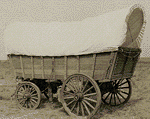History of Free Frank: Introduction
Copyrighted Material
Introduction
 No
aspect of America's history has so captured the nation's imagination
as the frontier experience. From the beginning of the seventeenth
century, the new American challenged and conquered a vast continent,
spectacularly rich in land and natural resources. Black pioneers
shared in building the new country, but a national image which
portrays successive waves of westward-moving pioneers fails
to reflect the full extent of black participation in the development
of America's frontiers. The subject of this book—Free
Frank, a black pioneer—played an active role in the development
of three successive frontiers as the new nation moved westward
in the era between the Revolutionary War and the Civil War.
Few contemporaries shared his distinctive experiences—an
Afro-American frontiersman who as a slave established his own
extractive mining operation and then, after purchasing his own
freedom, was a frontier land speculator, commercial farmer,
stockraiser, town founder, and town developer. Free Frank's
diverse business activities were motivated by an overwhelming
drive to buy his family's freedom. Over a period of forty years
he purchased sixteen family members, including himself, from
slavery. The total cost—some $15,000—Free Frank
earned during his lifetime as a pioneer entrepreneur on the
new nation's western frontiers. No
aspect of America's history has so captured the nation's imagination
as the frontier experience. From the beginning of the seventeenth
century, the new American challenged and conquered a vast continent,
spectacularly rich in land and natural resources. Black pioneers
shared in building the new country, but a national image which
portrays successive waves of westward-moving pioneers fails
to reflect the full extent of black participation in the development
of America's frontiers. The subject of this book—Free
Frank, a black pioneer—played an active role in the development
of three successive frontiers as the new nation moved westward
in the era between the Revolutionary War and the Civil War.
Few contemporaries shared his distinctive experiences—an
Afro-American frontiersman who as a slave established his own
extractive mining operation and then, after purchasing his own
freedom, was a frontier land speculator, commercial farmer,
stockraiser, town founder, and town developer. Free Frank's
diverse business activities were motivated by an overwhelming
drive to buy his family's freedom. Over a period of forty years
he purchased sixteen family members, including himself, from
slavery. The total cost—some $15,000—Free Frank
earned during his lifetime as a pioneer entrepreneur on the
new nation's western frontiers.
Free Frank lived as a slave for forty-two years. In the South
Carolina Piedmont frontier where he was born in 1777 he experienced
the turmoil of the Revolutionary War and its aftermath. Before
the turn of the century he was taken to the new Kentucky Pennyroyal
frontier, where he labored for fifteen years to subdue a
desolate wilderness land and to develop his owner's pioneer
farm homestead. By 1810 Free Frank began hiring his own time,
and with markedly shrewd enterprise he set up a saltpeter
manufactory during the War of 1812. From the profits which
remained after paying his owner for allowing him to hire his
own time, he purchased first his wife's freedom in 1817 and
then his own in 1819.
With freedom came the expansion of Free Frank's entrepreneurial
activities on the Kentucky frontier. While he continued to
manufacture saltpeter, frontier land speculation and commercial
farming were added to the growing list of his enterprises.
Then in 1830 he made the westward move to Illinois, where
he established a pioneer homestead on the highly productive
but undeveloped and sparsely populated frontier of the Illinois-Mississippi
River Valley. In Pike County the black pioneer continued his
speculation in land, and stockraising broadened the scope
of his commercial farm enterprise. Caught up in the Illinois
town-platting boom of the mid-1830s, Free Frank founded his
town, New Philadelphia, and as its proprietor promoted its
development until his death in 1854 at the age of seventy-seven.
Free Frank's life story provides new evidence that Afro-American
economic activities where they existed on the nation's antebellum
frontiers contributed to the transformation of wilderness
areas into established communities. From another perspective,
his activities as a black pioneer entrepreneur provide additional
insights into the multiplicity of responses by Afro-Americans
as they contended with life in the new nation before the Emancipation
Proclamation's promise of freedom. Few historical studies
fully document the wide range of activities of the pioneer
slaves who developed the southern frontiers. Nor has serious
historical inquiry been directed to the lives of those comparatively
few free blacks whose experiences differed little from those
of the white pioneers who forged the Old Northwest frontiers.
Although free blacks averaged 10 percent of the Afro-American
population from 1790 on, plantation slavery, urban slavery,
and industrial slavery have been the areas of paramount interest
for students of the Afro-American historical experience.
Recently free blacks in the cities of the new nation have
also become a subject of historical research. This examination
of the life of Free Frank appraises a seriously neglected
but important area in Afro-American and western frontier
history.
The origin and development of Free Frank's town, New Philadelphia,
comprise another important part of this study. The New Philadelphia
town records provide the only documented case of a town founded
by a black man in antebellum America. Thus Free Frank's activities
as an Afro-American town founder, proprietor, promoter, and
developer are important. His pioneering role foreshadowed
the direction that would be taken by other blacks who founded
or promoted towns on the nation's frontiers after the
Civil War. Certainly it appears that for black town founders
throughout the nineteenth century, America's frontiers provided
less restraint of economic activities than did life in established,
densely populated communities. With the increasing interest
in black town founding in Afro-American historiography, New
Philadelphia's development into a biracial antebellum frontier
town provides a distinct contrast with most black towns founded
after the Civil War.
|


 No
aspect of America's history has so captured the nation's imagination
as the frontier experience. From the beginning of the seventeenth
century, the new American challenged and conquered a vast continent,
spectacularly rich in land and natural resources. Black pioneers
shared in building the new country, but a national image which
portrays successive waves of westward-moving pioneers fails
to reflect the full extent of black participation in the development
of America's frontiers. The subject of this book—Free
Frank, a black pioneer—played an active role in the development
of three successive frontiers as the new nation moved westward
in the era between the Revolutionary War and the Civil War.
Few contemporaries shared his distinctive experiences—an
Afro-American frontiersman who as a slave established his own
extractive mining operation and then, after purchasing his own
freedom, was a frontier land speculator, commercial farmer,
stockraiser, town founder, and town developer. Free Frank's
diverse business activities were motivated by an overwhelming
drive to buy his family's freedom. Over a period of forty years
he purchased sixteen family members, including himself, from
slavery. The total cost—some $15,000—Free Frank
earned during his lifetime as a pioneer entrepreneur on the
new nation's western frontiers.
No
aspect of America's history has so captured the nation's imagination
as the frontier experience. From the beginning of the seventeenth
century, the new American challenged and conquered a vast continent,
spectacularly rich in land and natural resources. Black pioneers
shared in building the new country, but a national image which
portrays successive waves of westward-moving pioneers fails
to reflect the full extent of black participation in the development
of America's frontiers. The subject of this book—Free
Frank, a black pioneer—played an active role in the development
of three successive frontiers as the new nation moved westward
in the era between the Revolutionary War and the Civil War.
Few contemporaries shared his distinctive experiences—an
Afro-American frontiersman who as a slave established his own
extractive mining operation and then, after purchasing his own
freedom, was a frontier land speculator, commercial farmer,
stockraiser, town founder, and town developer. Free Frank's
diverse business activities were motivated by an overwhelming
drive to buy his family's freedom. Over a period of forty years
he purchased sixteen family members, including himself, from
slavery. The total cost—some $15,000—Free Frank
earned during his lifetime as a pioneer entrepreneur on the
new nation's western frontiers.